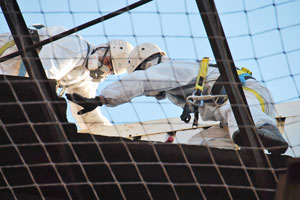In a recent asbestos exposure case, Davis v. Honeywell International, Inc., California’s second appellate district has allowed an expert witness to testify that every asbestos exposure is a substantial factor in causing the disease. This goes against the trend around the country of courts rejecting plaintiff experts’ attempts to proffer similar testimony and moves away from Sargon Enterprises, Inc. v. University of Southern California (2012) 55 Cal.4th 747, which held that trial courts are supposed to play a “gatekeeper” role in keeping out unreliable expert evidence. Davis opens the door in allowing a jury, not the trial court in its “gatekeeper” role, to decide whether to accept the theory.
Davis v. Honeywell International, Inc.
In Davis, an auto mechanic and home remodeler sued Honeywell, alleging that his exposure to asbestos in Bendix brake linings that he used in performing brake jobs in the 1960s and 1970s was a substantial factor in contributing to his risk of developing malignant mesothelioma. The Bendix linings were 50 percent chrysoltile asbestos by weight. Honeywell is responsible for the injuries caused by brake products manufactured by the Bendix company. When the plaintiff died, his daughter was substituted as plaintiff in her capacity of personal representative of her deceased father.
Prior to trial, Honeywell filed a motion in limine to preclude the plaintiff from presenting expert testimony that every exposure to asbestos contributed to Davis’s mesothelioma. The trial court denied the motion and plaintiff’s experts were allowed to testify.
Expert Testimony Offered at Trial
At trial, Dr. James A. Strauchen, M.D., a pathologist, testified for the plaintiff that mesothelioma can occur with very low doses of asbestos exposure, that each exposure is cumulative, and that mesothelioma typically occurs 20 to 50 years after exposure. The plaintiff’s other expert, Dr. Barry Castleman, testified that reports and articles that have been published, beginning in the 1890s, warning of the dangers of asbestos exposure.
Honeywell presented its own expert testimony from an epidemiologist, an industrial hygienist, a pathologist, and an expert in brakes and brake safety. The epidemiologist testified that there was no association between employment as a mechanic and the risk of mesothelioma. The industrial hygienist testified that Davis’ probable cumulative exposure from his work with brakes was below the Occupational Safety and Health Administration (OSHA) limits. He also testified that extremely high heat applied to the brake linings converts asbestos fibers into non-toxic substances. Honeywell’s pathologist testified that exposure to brake dust does not cause mesothelioma. Its brake expert testified about why asbestos was used in brake linings.
Honeywell Challenges Trial Court’s Failure to Exclude Expert Testimony
The jury found for the plaintiffs and Honeywell appealed. On appeal, Honeywell’s primary argument was that the trial court failed to properly exercise its gatekeeper role and exclude Dr. Strauchen’s testimony that was based upon an “every exposure” theory. Honeywell argued that: (1) the testimony was speculative and illogical; (2) he improperly relied upon regulatory standards which do not establish causation; (3) the theory is not supported by scientific literature or epidemiological studies; (4) it is contrary to the direction in Rutherford v. Owens Illinois (1997) 16 Cal.4th 953, that a causation analysis must proceed from an estimate concerning how great a dose was received; and (5) other jurisdictions have rejected this theory.
The court in Davis rejected each of Honeywell’s arguments. It noted that Rutherford held that a plaintiff in an asbestos-related cancer case could demonstrate causation “by demonstrating that the plaintiff’s exposure to defendant’s asbestos-containing product in reasonable medical probability was a substantial factor in contributing to the aggregate dose of asbestos the plaintiff or decedent inhaled or ingested, and hence to the risk of developing asbestos-related cancer.” Rutherford v. Owens-Illinois, Inc., 16 Cal.4th 953, 976-977, fn. omitted (1997). The court found that the plaintiff properly presented such testimony and that the trial court did not abuse its discretion in allowing it.




